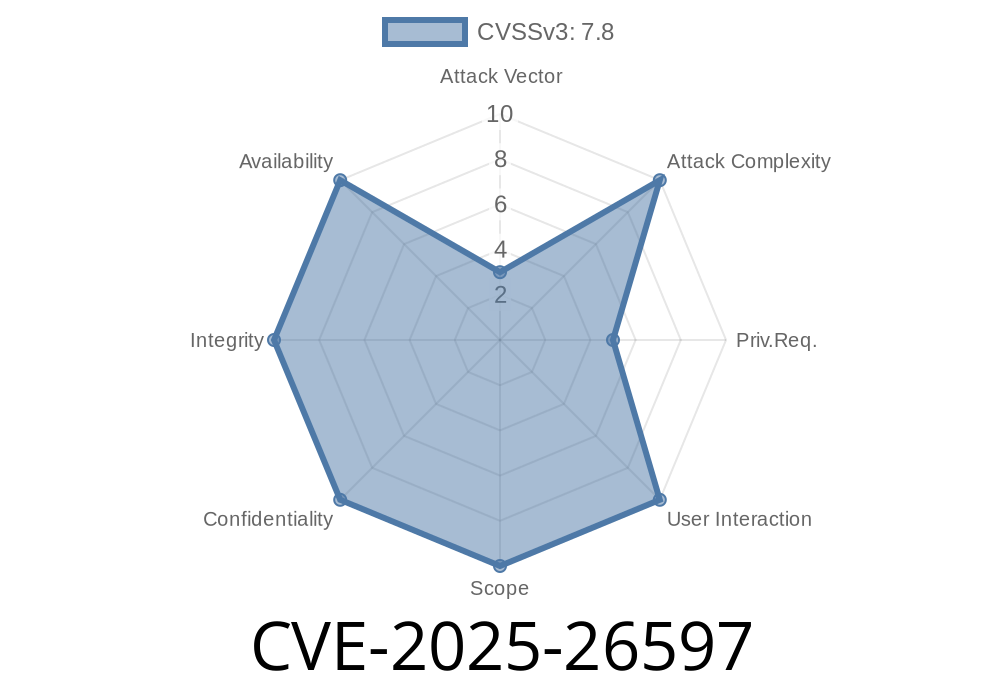A new buffer overflow vulnerability, CVE-2025-26597, was discovered in the widely used X.Org and Xwayland display servers. The issue lies in the XkbChangeTypesOfKey() function, where improper handling of group values can allow attackers to overwrite memory, potentially leading to code execution or a denial of service. In this article, we'll break down how the vulnerability works, explore how it can be exploited, and look at sample code and patches. Whether you're a sysadmin, penetration tester, or just getting into Linux security, this guide will help you understand and identify the CVE-2025-26597 flaw.
X.Org: The open-source implementation of the X Window System commonly found on Linux and UNIX.
- Xwayland: An X server running as a Wayland client, offering compatibility for legacy X applications.
Both are essential for graphical environments in many Linux distributions, making vulnerabilities here high-impact.
Where is the Bug?
Buffered memory handling for keyboard events is core to user input in X. The problematic function is XkbChangeTypesOfKey().
- When called with group = , the function resizes the key symbol table down to zero, but does not touch the key actions table.
- If called later with a non-zero group, it resizes upwards, but the key actions table is now mismatched — still sized for zero groups.
- Later code assumes key actions and symbol tables are in sync, and as a result, a buffer overflow occurs when writing beyond the incorrectly sized actions array.
Simple Illustration
void XkbChangeTypesOfKey(Key key, int groups) {
resize_key_symbols(key, groups); // This resizes symbols array to groups size
// BUG: key actions data is not resized when groups==
// key->actions stays the same (stale size) if groups==
// Later, if called with groups > :
resize_key_symbols(key, groups); // Grows symbols array
// key->actions still small - about to overflow!
memcpy(key->actions, src, groups * sizeof(Action)); // Boom!
}
Why This Matters
Because X servers typically run with elevated privileges, especially on older or misconfigured systems, a buffer overflow here could allow local users or compromised clients to run arbitrary code on the host. Even with sandboxing, a crash is possible, disrupting graphical sessions.
Exploitation Step-by-Step
Let's see how this vulnerability can be turned into a real attack.
An attacker crafts a sequence of requests to the X server or Xwayland process
- First call: XkbChangeTypesOfKey() with group set to . This action shrinks the key's symbol table to zero but leaves the actions table untouched (still sized for the previous, larger symbol count).
- Second call: XkbChangeTypesOfKey() with a non-zero group value (e.g., 4). This resizes the symbols table up, but the actions array is outdated and too small.
2. Overflowing Memory
Now, code paths that copy or use key actions will overflow the key actions buffer, possibly overwriting neighboring data in memory. A skillful attacker could arrange memory to place attacker-controlled data after the buffer and trigger execution.
Simplified Exploit Pseudocode
// Simplified pseudocode to demonstrate the plumbing (NOT weaponized)
Display *dpy = XOpenDisplay(NULL);
XkbDescPtr xkb = XkbGetMap(dpy, , );
// Step 1: Resize with group=
XkbChangeTypesOfKey(xkb, KEY_CODE, , ...);
// Step 2: Resize again with group=4 (actions table not updated)
XkbChangeTypesOfKey(xkb, KEY_CODE, 4, ...);
// Step 3: Cause an action to be triggered (overflow!)
// At this point, the overflow can corrupt adjacent memory
trigger_key_action(KEY_CODE);
Overwriting control data, such as function pointers or adjacent sensitive structures.
Note: Currently, there are no public proofs-of-concept for RCE. But a denial-of-service crash is trivial.
Real-World Impact
- Who is at risk? Any system running unpatched X.Org or Xwayland where malicious clients can send keyboard mapping requests.
- Privilege escalation? Less likely on systems with strict privilege dropping, but still possible under some setups.
Advisory:
X.Org Security Advisory CVE-2025-26597
Upstream patches:
Xorg/xserver commit fixing CVE-2025-26597
- Community post/analysis (Red Hat bug):
Red Hat Bugzilla Entry
General background:
XKB - X Keyboard Extension Protocol Spec
Consider enabling AppArmor or SELinux policies for better confinement.
#### Example Patch Snippet (Link)
// After fix - both symbol and actions tables are resized in sync
void XkbChangeTypesOfKey(Key key, int groups) {
resize_key_symbols(key, groups);
resize_key_actions(key, groups);
}
Conclusion
CVE-2025-26597 exploits a mismatch between key symbol and action table management, leading to a dangerous buffer overflow in X.Org/Xwayland. Though not yet widely exploited in the wild, it remains a risk for desktop Linux users and anyone running untrusted X clients. Patch promptly, audit your X server usage, and stay aware of similar memory-management bugs in complex legacy codebases!
Stay safe and update today!
*(If you want hands-on proof-of-concept code for research purposes, clone the relevant repo and review your distro security advisory first.)*
Timeline
Published on: 02/25/2025 16:15:38 UTC
Last modified on: 03/21/2025 17:50:53 UTC
